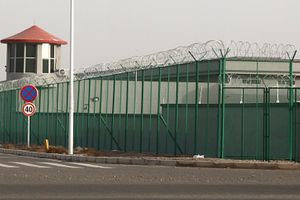Days after a group of 22 nations signed a letter addressed to the president of the UN Human Rights Council and the UN High Commissioner for Human Rights calling on China to end its massive detention program in Xinjiang, a group of 37 countries submitted a similar letter in defense of China’s policies.
The text of the first letter, criticizing China, has been made available (PDF); the second letter has not yet made its way into the general public but both letters reportedly included requests that they be recorded as documents of the Human Rights Council’s just-concluded 41st Session.
In the first letter, the signatories express concern about “credible reports of arbitrary detention” in Xinjiang and “widespread surveillance and restrictions” particularly targeting Uyghurs and other minorities. The signatories call on China to uphold its national laws and international commitments, including as a member of the Human Rights Council, and “refrain from the arbitrary detention and restrictions on freedom of movement of Uighurs, and other Muslim and minority communities in Xinjiang.”
According to the Associated Press, in the second letter the signatories expressed their opposition to “politicizing human rights” and reiterated China’s defense of what Beijing calls “vocation education and training centers” and critics call detention centers or “re-education camps.” Reuters quotes the letter more deeply, including a passage in which the signatories justify China’s efforts: “Faced with the grave challenge of terrorism and extremism, China has undertaken a series of counter-terrorism and deradicalization measures in Xinjiang, including setting up vocational education and training centers.”
The competing cadres of countries lined up on opposing sides of the Xinjiang issue is revealing.
Those that signed the first letter, criticizing China, include: Australia, Austria, Belgium, Canada, Denmark, Estonia, Finland, France, Germany, Iceland, Ireland, Japan, Latvia, Lithuania, Luxembourg, the Netherlands, New Zealand, Norway, Spain, Sweden, Switzerland, and the UK.
Signing the second letter, in defense of China’s policies, were: Algeria, Angola, Bahrain, Belarus, Bolivia, Burkina Faso, Burundi, Cambodia, Cameroon, Comoros, Congo, Cuba, Democratic Republic of the Congo, Egypt, Eritrea, Gabon, Kuwait, Laos, Myanmar, Nigeria, North Korea, Oman, Pakistan, Philippines, Qatar, Russia, Saudi Arabia, Somalia, South Sudan, Sudan, Syria, Tajikistan, Togo, Turkmenistan, United Arab Emirates, Venezuela, and Zimbabwe.
Immediately noticeable is the geographic divergence between each list. The first is dominated by Western states, mostly in Europe, and the second stuffed with African and Middle Eastern nations. Importantly, the first letter does not include a single signature from a Muslim-majority state while the second features many, including Saudi Arabia and Pakistan.
Then there are the countries that don’t appear on either list. The absence of the United States — which left the UN Human Rights Council last summer in a huff — is particularly important. While the United States has been selectively critical of China’s Xinjiang policies, the Trump administration appears unwilling to push too far overall, prioritizing trade negotiations over human rights criticisms. The Washington Post’s Editorial Board commented in an op-ed over the weekend: “The United States ought to be at the forefront of exposing and denouncing these abuses. Instead, the State Department and White House speak out only when convenient for Mr. Trump’s other priorities.”
Noticeable also is the absence of most of Central and Eastern Europe. For example, of the countries in the so-called 16+1 — a format bringing together in routine dialogue the states of Central and Eastern Europe (CEE) and China — only Estonia, Latvia, and Lithuania stood up to criticize China. The rest — Albania, Bosnia and Herzegovina, Bulgaria, Croatia, the Czech Republic, Hungary, Macedonia, Montenegro, Poland, Romania, Serbia, Slovakia, and Slovenia — neglected to pick a side. Greece also sat out.
Also among those conspicuously absent from either list are Kazakhstan, Kyrgyzstan, and Uzbekistan. Tajikistan and Turkmenistan sided with China, but the other three Central Asian states appear to be trying to remain neutral. For Kazakhstan and Kyrgyzstan most prominently, the Xinjiang issue has become a domestic issue with protests and civil society organizations advocating for attention to the Xinjiang camps. Ethnic Kazakhs and Kyrgyz are among those who have been detained and civil society organizations have sprung up around families whose relatives have vanished in Xinjiang.
From Asia, the absences of Malaysia, India, and Indonesia are notable, as are the absences of Bangladesh, Sri Lanka, and the Maldives. Malaysia, a Muslim-majority state, has raised concerns about China’s Xinjiang policies several times, and even risked Beijing’s ire by refusing to deport a group of Uyghurs back to China last year. Yet Malaysia did not sign the letter questioning the treatment of Uyghurs and other ethnic groups. Indonesia has the world’s largest Muslim population, India hosts the third-largest, and Bangladesh the fourth. Both Sri Lanka and the Maldives have hit international headlines for their political and economic entanglements with China, but neither signed either letter. The Pacific Island states were also absent.
It’s not quite clear how each side gathered signatures (did anyone ask, say, Vanuatu?) and every country has its reasons for signing or not. For many, China’s economic heft is a primary concern when deciding to rebuke Beijing so publicly. For other states, such as Russia, Saudi Arabia, and North Korea, their own human rights records at home have come under frequent attack abroad and so defending China becomes a roundabout way of defending themselves.

































